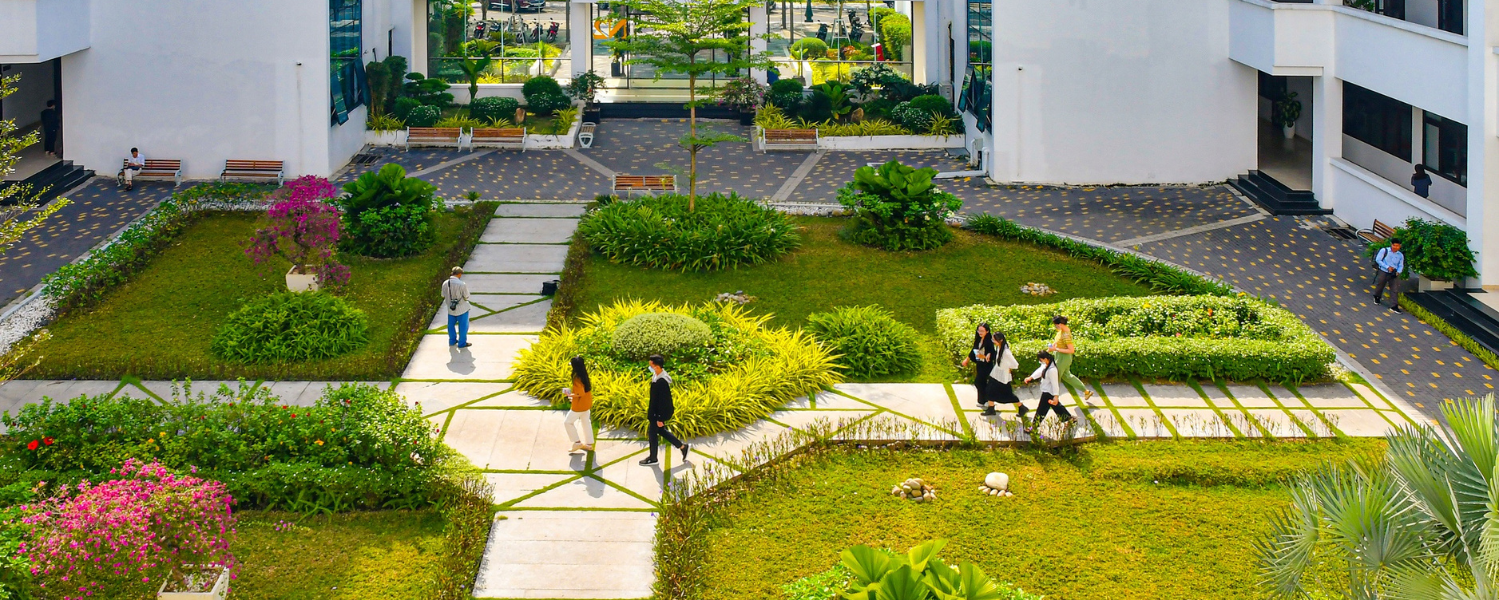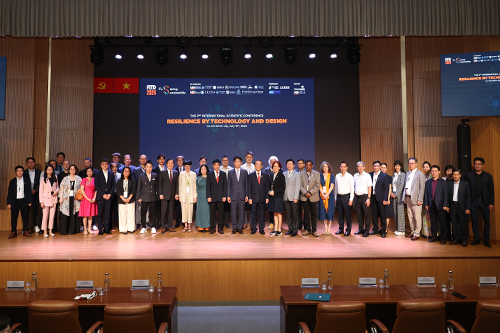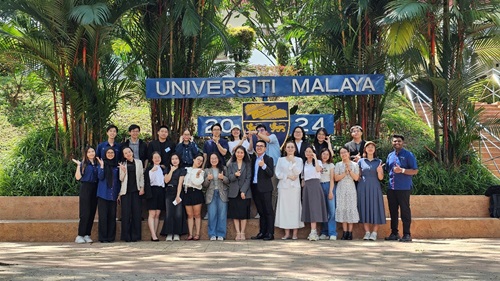
From multidisciplinary research to sustainable action community
On the evening of January 15, 2024, at the Launching Ceremony of UEH Student Scientific Research 2024, Representatives of the Project Committee shared the topic "From multidisciplinary research to a community of sustainable action", giving students a new and practical research approach, while creating a bridge to bring them closer to sustainable development in the UEH community.
.jpg)
In the context that the world is increasingly facing many global challenges, especially issues related to the environment and sustainable development, multi-disciplinary knowledge becomes an important factor in solving current problems. Deeply aware of this necessity, University of Economics Ho Chi Minh City (UEH) is gradually transforming from single-discipline research to interdisciplinary research and sustainable action, choosing a new approach through the UMS and Living Lab models.
In the sharing section, Dr. Trinh Tu Anh presented the Strategic Model of UEH Multidisciplinary and Sustainable University. This is a model directly related to the 5 pillars of UEH Sustainable University: (1) Training: Global Citizen - Sustainable Action; (2) Research: Research for the community; (3) Operations: From green campus to carbon neutrality; (4) Governance: Prioritize sustainable development; (5) Community: Community of people who inspire art and lead changes for sustainable development. UEH's sustainable development orientation model is comprehensive, in which Research is an important pillar, strongly interacting with the remaining pillars.
.jpg)
Accordingly, Research with the orientation "For the community", is emphasized by the approach of connecting "multidisciplinary - interdisciplinary - transdisciplinary" knowledge, combining the community of stakeholders having common interests in many different professions and fields. The ultimate destination of research activities is to solve contemporary problems that constantly arise in the process of global development.
Thanks to its openness and close connection with the community, multidisciplinary - interdisciplinary - transdisciplinary research has the opportunity to be tested in practice and go through adjustment stages before becoming complete solutions put into practice.
.jpg)
Besides, the process of transferring multidisciplinary research results into real life is an important issue. To do this, it is necessary to have close coordination between researchers from different fields, as well as the participation of other subjects in society and approaches to applying interdisciplinary research results, including awareness, communication/transmission, social learning, reference, empowerment, influence, trust building, application/replication, effort and reevaluation. Applying these methods will help improve the effectiveness of accessing and applying interdisciplinary research results, contributing to solving practical problems more effectively.
In order for research for the community and community engagement to operate effectively, Dr. Trinh Tu Anh also introduced the Living Lab model - an open innovation ecosystem operated with a user-centered orientation, making optimal use of the connection between stakeholders, whose core element is to integrate research, education, and innovation to solve real-life problems.
For example, the application of the Living Lab model to solve problems of Smart Cities: this model can create an integrated research platform to jointly research, test, develop, and create innovative products/services/systems to thoroughly solve each problem of the urbanization process by applying technology and innovation in each specific locality/region.
With a vision for 2030, UEH University from the stage of a "Zero Waste Campus" became a "Green Campus" and has contributed to the development of a sustainable University. UEH Green Campus Living Lab has been deployed since 2023 as one of the main activities of the "UEH Green Campus" project.
UEH Green Campus Living Lab was born as a living laboratory to solve environmental problems at UEH campuses, combining training - research - operations - administration - community, to form a formula that other units can adopt and deploy:
- Training: Promoting the use of smart education platforms listed as the application of game simulation technology (gamification), practical activities to educate Waste Classification, the 3R model and behavior changes; Introducing knowledge regarding demand, demand control, creative ideas to solve social problems, green economy, circular economy, sustainable financial models in business operations, sustainable business management program, etc.; Incorporating output standards and exercises into each subject and curriculum; Integrating Multidisciplinary - interdisciplinary, integrating economic - technical - technological - social factors to thoroughly solve the problem of waste and sustainable development.
- Research: Incubating new ideas about collecting and recycling waste, developing a circular economy and turning waste into resources, thereby creating living labs to solve problems; Researching models to reduce unnecessary use, models to change consumer demand, sustainable financial models, and developing smart education platforms.
- Operation: Using multi-channel communication model; Plan: First step (2021 - 2022): youth orientation: inspire to change awareness, thinking, action - From 2022: Students and communities build their own programs; UEH Go Green Station: Waste classification and transfer station, turning waste into resources.
- Administration: Implementing zero waste and sustainable administration.
- Community: Calling for action from learners, lecturers, staff, and partners to proactively practice zero waste at campuses and where they live and work through practical activities; Connecting relevant stakeholders: Waste collection, treatment, and recycling units; circular economy organization; zero-waste practices organizations.
At UEH Green Campus Living Lab, problems and research topics addressed are
- Behavior Change: Changing behaviors to solve waste problems, green living problems, practices of the 3R lifestyle (Reduce, Recycle, Reuse), practices of a lifestyle that minimizes carbon emissions from each individual;
- Demand Change: Changing demand, practice demand reduction (Reduce), consume enough to solve the problem of minimizing waste and reducing carbon emissions;
- Technical Issue: Developing technological solutions to treat odors for waste management; Sensor solutions to save electricity, water, and reduce carbon emissions; Image processing equipment supports waste classification and reduces carbon emissions;
- Circular Economy: Research, solutions, policy development, models for turning waste into valuable resources, recycling, developing circular economy;
- Efficient Communication and Education Program: Research models, social media initiatives, and educational programs to raise environmental protection behaviors and awareness of green living, waste reduction, energy saving, and emissions reduction.
Students interested in the Sustainable University project as well as the UEH Green Campus Living Lab can find out more detailed information through the project's official website: https://gogreen.ueh.edu.vn/.
News and photos: Sustainable University Project Committee, UEH Union - Association


![[Podcast] Does the Financial Flexibility Prevent Stock Price Crash Risk during COVID-19 Crisis? Evidence from the Vietnamese Stock Market](https://en.ueh.edu.vn/images/upload/thumbnail/ueh-thumbnail-114718-071624.png)
![[Podcast] An Evaluation Of Two Business English Course Books, Business Partner B1+ Business Partner B2: Students’ And Teachers’ Perspectives](https://en.ueh.edu.vn/images/upload/thumbnail/ueh-thumbnail-113649-071624.png)


![[Podcast] Latest approaches for sustainable universities](https://en.ueh.edu.vn/images/upload/thumbnail/ueh-thumbnail-042022-071224.png)